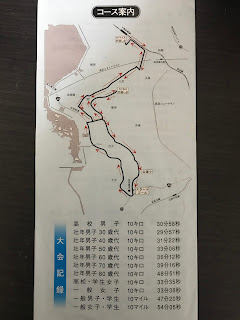The Kanto 10 Mile Road Race is the oldest 10-mile road race
in the world, having begun in March 1937. The race currently starts
and finishes next to a temple, about 10 minutes’ walk from Sogosando Station in
Chiba Prefecture, close to Narita. Arriving at the race HQ in the temple grounds
on the cold and windy morning of December 17th, there were runners standing around
huddled in groups or laying on the ground relaxing.
From the little information that I had managed to obtain
prior to the race, I knew that the last 1km of the race was all uphill. I searched for the start line on the road by the side of the
temple, and set off to walk the last stretch of the course. Having confirmed
that there was indeed a fairly steep hill from the 15km to 16km point, I
stripped down and jogged the first 2km part of the course, which runs in the
opposite direction along the road. I managed to get back to the start point
just in time to watch the 10KM race start, which had a field of about 300
runners and was won this year in a time of 32:30.
Surprisingly, the field for the 10-miler that gathered on
the start line a few minutes later was much smaller, with just over 150
runners. I could see that there was a large contingent of runners from Juntendo
University and Chuo University. Perhaps they were using the race as a final
tune-up before the Hakone Ekiden at the beginning of January, the highlight of
the university and running calendar in Japan. When the race started, the
university teams began at a sprint, quickly rounding a bend in the road and passing
the main entrance of the temple, before heading out of the town along a main
road.
For the first 1km I ran with the front pack of the second group,
with the large leading pack of university runners having already sprinted away.
However, the second group slowed to 6 minute mile pace, so I
decided to push on by myself, running the the rest of the race alone.
After 1.5 miles, there was a steep downhill section, before quickly levelling
out again for another KM. There was a queue of cars at a traffic light on this
section of road. I had not anticipated cars on the course,
and I was forced to cross into the middle of the road to get around them.
At about 3km, the course turned off the main road, and from there
followed a long out and back section on a narrow road through rice fields. As I
was running alone, I had to work hard to try and keep pushing myself with no
one to chase. I could see a small group of 3-4 runners that had come detached
from the leading pack about 300 metres ahead of me in the distance, but they
did not seem to be getting any closer. The wind was strong, and the number pinned
onto my vest strained against the safety pins, in danger of being torn
off.
Just after the 7km point, some relief came as the large leading
pack came hurtling past me on the opposite side of the road. Soon afterwards, I
too turned back around at a cone next to a house on the edge of a rice field. Somehow, I felt strong and managed to push along at a decent pace
back along the narrow road. Rounding a bend in the road at the 15km point, a
small group of spectators had assembled at the bottom of the last climb, and
one woman shouted at me, “last kiro”. At this I took an extra deep breath to gather
myself and then hit the hill as hard as I could, thinking that I still had a
chance to get a small PB if I didn’t lose too much time on the hill. I remember
that last km hurt, but the time seemed to pass quicker than I expected. The
road levels again at the top of the climb and there is a short flat stretch
before you turn to the left off the road and the finish line is set back about
30 meters from the road in front of an entrance to a school.
The winning time for the 10-mile race was 49:41. This is a good road race, attracting a strong field of university runners, with 21 men finishing in under 52 minutes. I finished
in 44th place in 58:40, which is a modest PB and a 15 second
improvement on my previous best. It was a nice way to end 2017, having started it with a half-marathon PB in January.















